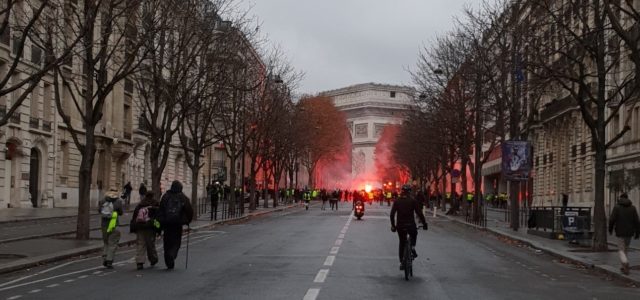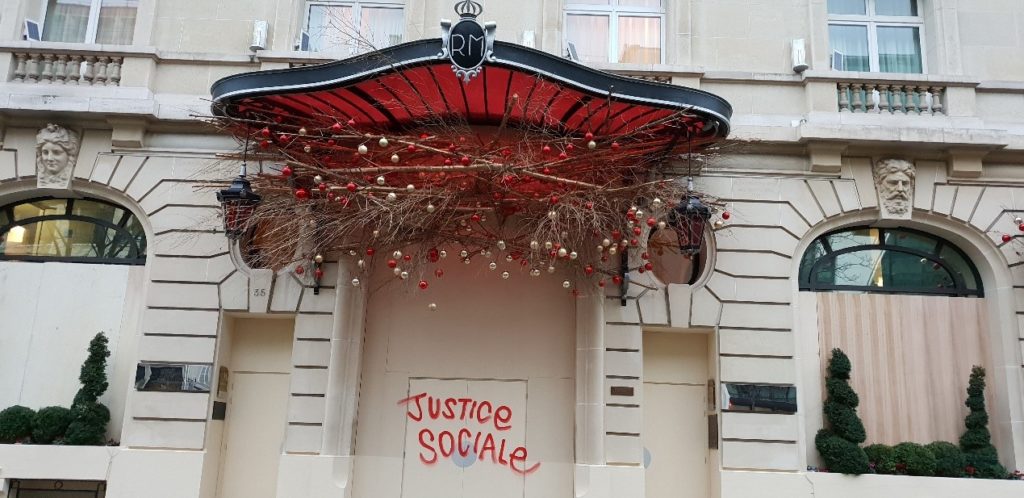Michalis Lianos
Interviewing people near the Arc de Triomphe amidst teargas and stun grenades is a great experience for a social scientist. It also reassures everyone concerned that history has not ended. Even the well formatted postindustrial humans are capable of producing unpredictable outcomes.
No one saw the yellow vests coming, then everyone else apart from themselves started having ideas on exactly who they were. Extreme-right rednecks, then left-wing agitators, then the low classes manipulated by the opposition parties… Then serious questions became necessary as the movement grew. Political institutions panicked to the point where all parties were invited by the French government to try and understand the situation together and bring everything back to the ‘normal’ framework of politics. But the point is precisely that the yellow vests wish to step away from that normality.
Revolutions do not start as revolutions. What is worse, they finish as regimes that introduce new inequalities, peculiar to their vision of the world. These two aspects are what the “gilets jaunes” seem to have deeply felt. Their progression in terms of political objectives is phenomenal. In four weeks, they have linked their starting point – the price of petrol – to a full-blown critique of the representative, parliamentary political system. They have side-lined the political system and talk openly about its obsolescence and the need to replace it. These are the people who in their overwhelming majority have never been militant and often talk of themselves as “a-political”. A fascinating paradox!
The members of the establishment cannot understand. What are exactly their demands? – Many and not all in the same direction. Who are their leaders? – No one. Someone who can negotiate for the entire movement? – No one either. Perhaps the trade unions? – No. Do they wish to set up a political party and gain power? – No. So, what do they want? – To be listened to and be able to lead a decent life.
This is a class movement not about class struggle. Their class can best be described as the lowest part of the ‘included’. Those who have difficulty to make ends meet but still feel that they form the heart of the French society. Manual workers, technicians, low status office employees and public servants, frontline salesmen and saleswomen, farmers, small business owners, truck drivers, teaching assistants, shopkeepers, health care aides, precarious artists, students obliged to hold other jobs… I tried and failed to find even one person who came from central Paris or its leafy suburbs.
The most radical point about them is that they coexist. In the same group one can find people who had never voted, others who have always voted for the Front National (the party changed its name in June to Rassemblement National) and others who have voted for the Left Front. Some weeks ago, these people thought of each other as fascists, extremists or clearly stupid enough not to be interested in politics. They are aware of that and they are aware that they may hold different opinions on several issues. But this has now become secondary. By coming together – largely via the Internet – they have focused on their experiences and feelings of being marginalised and humiliated. They see party politics and those who conduct it as a detached elite that play their own game in another world above the heads of the people. They realise that they agree; they have been forgotten in that game and bypassed via media-trained language.
They also seem to increasingly realise that this elite world is not that necessary any longer. They talk about immediate participation, frequent referenda on important questions and direct democracy. That is no excited revolutionary talk but calm, pragmatist discourse that comes out of their own practice. They naturally think that if they – the “simple people” – can coordinate themselves directly throughout the country every day, there is no need to leave everything to an elite which they will relegitimise by voting every four or five years. One may jump to jargon and call this prefigurative or actualising politics, but it is not. It does not stem from a pre-existing ideological tendency or even a will to change something. There was no pre-agreed point to prove among the yellow vests, no shared prescriptive vision. All they had in common was that they were “fed up” with their socioeconomic condition. As a farmer from the Charente region told me: “then, I thought ‘this is the last straw’; I got on my tractor and headed for a roundabout to block”.
My term for this emerging condition is experiential politics. What I mean by this is that experience as such can now lead to the coordination of political representation and practice without a centripetal or pyramidal structure. That coordination is conjunctural. It appears ideologically loose and politically inefficient but that is only because we are still bound by the history of current political systems. The yellow vests use their experiences to emancipate themselves from overbearing political representations that would entrap them into ideological schemes which require permanent belonging. They venerate, like almost everyone in France, the Declaration of Human Rights but have no hesitation to think that these rights are no longer served by the current political system. This way of hacking politics cuts across the various currents within the movement. In fact, they increasingly focus on demanding the introduction of referenda initiated by the citizens themselves while most of them think that a new directly elected constitutional assembly is necessary to change existing institutions and break with the current political system.
There is no lack of ideas on the European Union either. While nuances exist, there is consensus that the peoples of Europe are connected not via formal institutions but via horizontal links peculiar to their conditions and difficulties. The distinction between “the people” and the elites seems to trump attachment to national identities, a sign of a much deeper “European integration” than EU agencies and policies can deliver. While the Euro often appears as a financial instrument of elite domination, there are no objections to an international economy based on local structures and local resourcing.
The yellow vests are not against the market, so long as it serves its social purpose and that is to offer everyone a decent life based on his or her own efforts. Contrary to other low-class based movements, the ideological pivot here is independence and, in many cases, more than that: autonomy. The paradox of a people’s movement aggregating around autonomy probably represents the galloping individuating developments since the end of the World War II. Collective action is naturally about what counts for us socially every time. And in this age what counts is an adequate individual condition. We are strongly linked by our aspiration to have our uniqueness recognised by society.
It follows naturally that for the yellow vests there is no intrinsic opposition between the collective and the individual. That is why drastic tax reduction and direct democracy sit comfortably on the same list of demands as do solidarity to asylum seekers and deportation of those who should not be given asylum. Contrary to ‘traditional’ party voters, yellow vests do not find it contradictory to aspire to live together as independent individuals. They are in that sense genuine postindustrial citizens who do not confound collectivity and community. Even when they are employees, they are steeped in uncertainty and competition; they see themselves as self-entrepreneurs bound to find their own way through the world of institutions and organisations. There are no beaten tracks and permanent priorities to follow, no linear careers and comfortable retirements waiting, no social identities that cannot be taken away. Contrary to ‘traditional’ movements, they are not nostalgic about communities and values, be they national or political. That is why they are not the populists that all political parties wished to portray them as and dismiss them accordingly. They are politically articulate individuals with a collective goal and want the best of both worlds in seeking personal fulfilment enabled by political solidarity.
Twenty years ago, I researched uncertainty and insecurity in Europe with a team of colleagues. We produced a long and serious report which included a series of recommendations and a warning on the challenge ahead: “No less is needed than a re-thinking of political governance as a dimension, rather than a guarantee, of individual existence; and this should be part of a plan to adjust institutional action so as to allow space for that dimension in each individual conscience.” Of course, our report – like those of so many other researchers – gathered dust in public agency shelves. About ten years later the movements of the squares started erupting in Madrid and Athens, and went on in Kiev, New York and elsewhere. A new, more mature, stage is now developing in France.
History is not written in advance. It may be that the receding institutions of artificial parliamentary majorities manage to stem the tide and partially mutate into an acceptable political form. It may also be that authoritarianism will come back to the centre stage of European history. But there is also reason to hope that a new form of democracy may painfully emerge in a genuine bottom-up way, where citizens do not need political parties and professional representatives to give shape to the world and live together decently. The yellow vests have shown that serious doubt can now be cast on the necessity of centralised power, not only on the basis of abstract ideology but also on the basis of ordinary daily experience, such as filling the tank of one’s car or paying utility bills. It is precisely the link that they established between their deeply prosaic low-class experience and their highly intellectual political vision that challenges the foundations of political power as we know it since the revolutions of the 18th century. This is no mean feat. Europe seems politically alive again.
Michalis Lianos is Professor at the University of Rouen – Normandy and the Editor of European Societies, the journal of the European Sociological Association.
Image credits: author’s own photos

